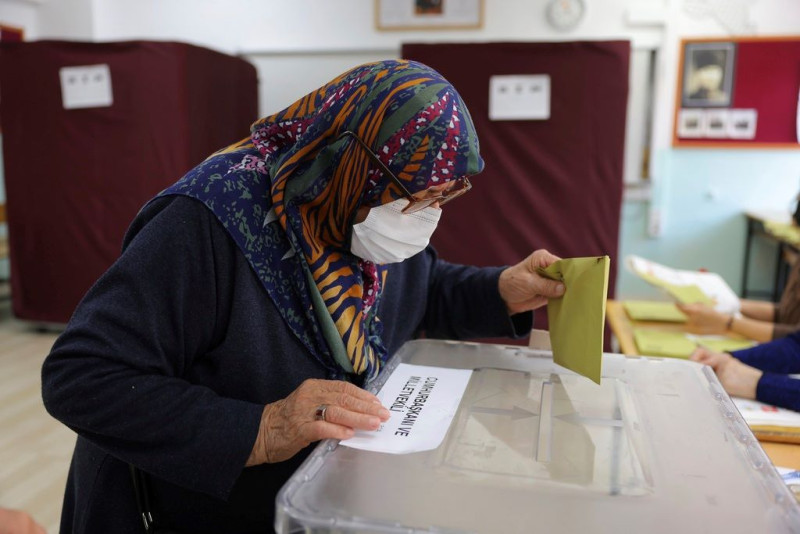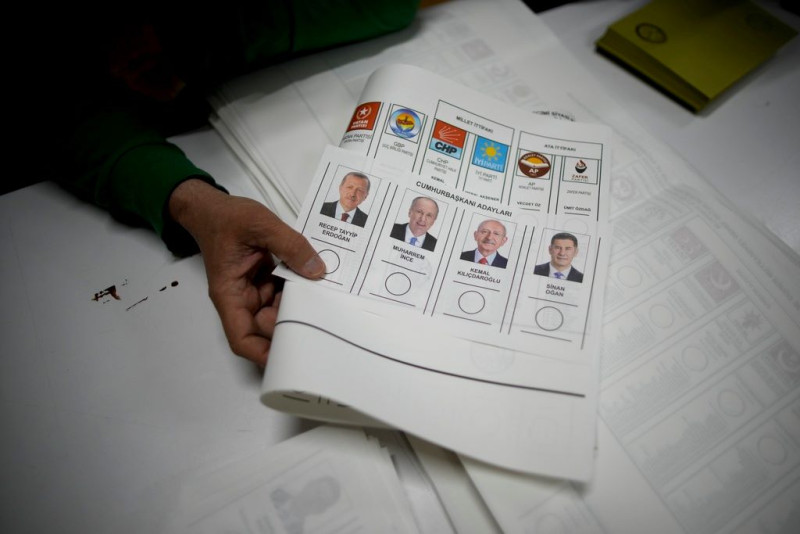Erdogan vows to uphold legitimacy, whatever the outcome – Fears of violence after polarized election climate
More than 60 million Turkish voters, among them 5.2 million young people who will vote for the first time, are called today to the country’s polling stations for one of the most crucial electoral contests in the history of modern Turkey, which may well mark the end of an era: of absolute sovereignty of Recep Tayyip Erdogan after 20 years in power.
Some 64 million voters are registered in the electoral rolls (out of a total of 85 million inhabitants). Of these, 3.4 million already voted abroad.
The polling stations opened at 08:00 [σ.σ. τοπική ώρα και ώρα Ελλάδας] and will close at 17:00. Under Turkish law, it is strictly forbidden to broadcast the results before 21:00.
According to SKAI correspondent Manolis Kostidis, a very large turnout is expected – approximately 90% of voters will exercise their right to vote.
The last poll before the polls showed a lead of 49.1% Kilicdaroglu – 46.9% Erdogan
Late in the evening, however, it is expected to have clarified whether a second round of the presidential elections will need to be held.
However, there are concerns that violent incidents may break out in Turkish cities, after a series of events in the final stretch of the highly polarized election campaign.
Today’s parliamentary and presidential elections decide not only who will govern Turkey, a NATO member state and – at least in theory – a candidate state for EU membership, but also how it will govern, the development of the economy, amid a crisis that has increased steeply the cost of living, as well as its foreign policy, which was marked by several rather unpredictable turns.
Battle for two
There are four candidates on the ballots for the presidential elections.
Recep Tayyip Erdogan, 69, in power for 20 years, is running for re-election. He is the candidate of the Islamic conservative Justice and Development Party (AKP).
His main opponent is Kemal Kilicdaroglu, leader of the Republican People’s Party (CHP, social democratic, founded by Mustafa Kemal in the ruins of the Ottoman Empire). The 74-year-old former civil servant is the candidate of the National Alliance, a motley coalition of six factions, which range from the nationalist right to the liberal center-left through political Islam.
Sinan Ogan, a former far-right MP, is also a candidate, but the latest polls give him only 5% of the vote.
The fourth is Muharrem Ince, who withdrew his candidacy on Thursday, but it was too late to withdraw his name from the ballot papers.
If no candidate secures a majority today, a second round will be held on May 28.
End of season;
Recep Tayyip Erdogan, 69 years old, a skilled orator, always a great campaign tactician, is fighting for his political survival.
Theoretically, the president can only be elected for two five-year terms.
But Mr. Erdogan is running for third because his victory in the 2014 presidential election, which took place when the system was still parliamentary, is not taken into account, after 12 years as Turkey’s prime minister.
Mr. Erdogan, if elected, will remain president until 2028.
However, his faction and himself assure that they will respect the legality, whatever the result.
On the other hand, Kemal Kilicdaroglu, who wants to change the system from presidential to parliamentary again and establish a single seven-year term for the presidency, has hinted that he will remain head of state for only one term.
Mr Kilicdaroglu, a 74-year-old former civil servant, promises if he wins to return Turkey to a more orthodox economic policy and its return to a parliamentary system, scrapping the presidential one Mr Erdogan introduced after a 2017 referendum. He also promises that he would restore the independence of the judiciary, which Mr Erdogan’s critics say has been turned into a tool to suppress dissent.
However, analysts point out that if he wins, Mr. Kilicdaroglu will face many challenges and will find it difficult to keep his alliance united, which includes nationalists, Islamists, supporters of the secular character of the Turkish state, liberals…
Source :Skai
With a wealth of experience honed over 4+ years in journalism, I bring a seasoned voice to the world of news. Currently, I work as a freelance writer and editor, always seeking new opportunities to tell compelling stories in the field of world news.











